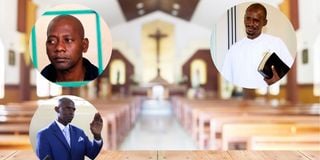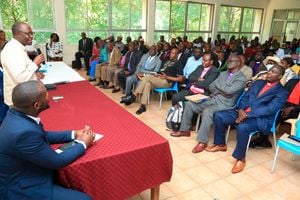
Cult leader Paul Mackenzie ( top left), Pastor Ezekiel Odero (top right) and Bishop Thomas Wahome (bottom left). Their churches have been deregistered by the State.
The government's proposal to regulate rogue religious organisations in the country has already met opposition, with some bodies, including churches, saying the move is illegal.
The heightened opposition comes just days after the Senate passed the Religious Organisations Bill 2024, which proposes punitive measures including heavy fines and long jail terms among other deterrents for those who violate the law.
On Thursday, the Aaca Movement, a political lobby, and Jehovah's Ministries condemned the bill, saying it would do more harm to the religious sector "in this country than the acts the proposed legislation is intended to address."
"The Aaca Movement says a big NO to this line of action. The government wants to enact punitive laws against the church under the lame excuse of taming rogue churches in the country," said Aaca Movement chairperson Kimani Ngunjiri, who is also the former Bahati MP.
The ex-MP revealed that all church organisations have been urged to sign petitions being circulated through umbrella bodies instructing lawyers to take legal action against this punitive and illegal government action.
Mr Joseph Maloba of Jesus Ministries said the passing of the law was like "giving a dog a bad name to strangle it."
"We are told that they will be known by their ways and actions and already we are seeing some individuals trying all tricks in the book to kill the church using punitive laws," Mr Maloba said. "They will not succeed."
The Bill, a product of the Senate inquiry into the Shakahola massacre, seeks not only to control the proliferation of extremist and predatory religious organisations blamed for promoting cultic tendencies but also to make them pay taxes on their income.
The bill proposes the establishment of the Office of the Registrar of Religious Organisations (ORRO), with a mandate to register and regulate the formation and administration of religious organisations and to ensure compliance with 'the regulatory provisions of the Act'.
The bill proposes that individuals, who run churches and other religious organisations that are not registered, will be fined up to Sh5 million or imprisoned for three years, or both.
A fine of Sh10 million or five years' imprisonment awaits those who convert or attempt to convert any person to their religion or convert any person from one religion to another through misrepresentation, force, undue influence, or coercion.
The Bill, which makes it mandatory for organisations to submit their books for an audit, defines a religious organisation as an organisation whose identity and mission is religious or spiritual and does not operate for profit.
An umbrella religious organisation is a duly registered religious body comprising at least 25 religious organisations with a board of trustees comprising a chairman, a vice-chairman, a treasurer, a secretary, and a religious leader with a degree, diploma, or certificate in theology.
According to the law, the organisations must promote the common good and social cohesion in society.
The organisations must also promote gender equality and social inclusion, religious, ethnic, political, and cultural tolerance, and ensure transparency and accountability in the conduct of their activities.
Early last year, mass graves believed to contain the bodies of followers of Pastor Mackenzie, the self-styled preacher of the Good News International Church, were discovered in Shakahola Forest, Kilifi.
So far, more than 400 bodies have been exhumed from the shallow graves and more than 600 others are reported missing.
Mackenzie is on trial for brainwashing and starving to death hundreds of his followers.
Following the discovery of the mass graves in Shakahola, the Senate passed a motion on 27 April 2023 to set up an ad hoc committee to investigate the 'disturbing' Shakahola killings and the proliferation of religious organisations in Kenya.
The ad hoc committee was chaired by Tana River Senator Danson Mungatana.
But Mr Ngunjiri noted that if the so-called "rogue churches" were involved in criminal activities, the police should go after them instead of targeting an entire religious sector.
"The criminals hiding behind religious organisations are well known to the DCI and other crime fighters including the NIS, provincial administrators, and Nyumba Kumi elders. The AACA movement has joined the ranks of those organisations in Kenya that are opposing the enactment of harsh anti-church laws," said Mr Ngunjiri.
Mr Stephen Ndicho, the secretary general of the Aaca Movement, said what the government was planning to do was "to harass and persecute the church".
"We say NO! The proposed legislation is unconstitutional because there was no public participation to hear what the churches had to say about the proposed laws," said Ndicho, the former Juja MP.
He noted that the constitution is clear on the freedom of people to assemble either as individuals or as a group of people to worship God, "where the issue of registration isn't made mandatory to do so".
"If such persons violate the law, then legal action should be taken against the culprits individually, but not to burden the entire religious sector with punitive measures of heavy fines and imprisonment."
The two noted that the Church in Kenya feels threatened by the government's desire to control and regulate it, "leaving the Church with no alternative but to seek legal redress".
They noted that regulating the church as proposed in the bill "is tantamount to taking Kenya to the heights of countries in the Middle East where religion is controlled, thus making them religious states".
[email protected]nmedia.com







